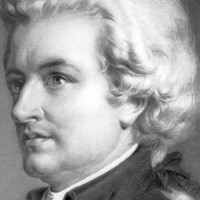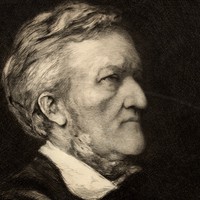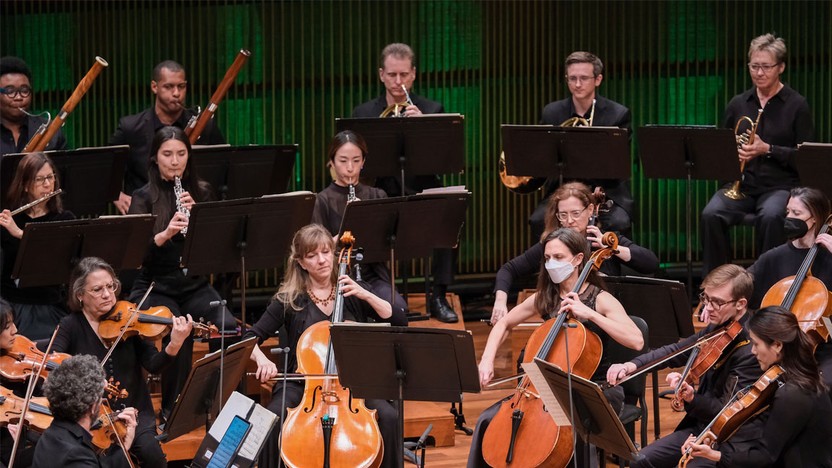Details

Wolfgang Amadeus Mozart
String Quartet No. 17, The Hunt

Richard Wagner
Siegfried Idyll
Cassie Pilgrim, oboe
Yoonah Kim, clarinet
Rena Kraut, clarinet
Andrew Brady, bassoon
James Ferree, horn
Matthew Wilson, horn
Lynn Erickson, trumpet
Steven Copes, violin
Eunice Kim, violin
Maiya Papach, viola
Julie Albers, cello
Zachary Cohen, bass
(Duration: 17 min)
The great love of Richard Wagner’s life was Cosima, the illegitimate daughter of Franz Liszt and his longtime mistress. She was 24 years younger than Wagner, and they were both married to others when they met, but still they consummated their infatuation in 1864, and she gave birth to Wagner’s daughter Isolde the next year. Cosima spent long periods at Wagner’s house at Tribschen, overlooking Lake Lucerne in Switzerland, and they had three children together by the time her divorce went through in 1870, allowing them to marry a month later.
Wagner capped that momentous year with an extraordinary birthday present for his thirty-three-year-old bride. On Christmas morning (she was actually born on the 24th, but she celebrated her birthday a day later), he woke up Cosima with the sounds of a fifteen-piece chamber orchestra piled onto the staircase outside her bedroom. She described the experience in her diary:
When I woke up I heard a sound, it grew ever louder, I could no longer imagine myself in a dream, music was sounding, and what music! After it had died away Richard came in to me with the five children and put into my hands the score of his Symphonic Birthday Greeting. I was in tears, but so, too, was the whole household; Richard had set up an orchestra on the stairs and thus consecrated our Tribschen forever! The Tribschen Idyll — thus the work is called!
The title Wagner inscribed on the original score was Tribschen Idyll with Fidi-Birdsong and Orange Sunrise, presented as a symphonic birthday greeting to his Cosima by her Richard. “Fidi-Birdsong and Orange Sunrise” were references to the sights and sounds Wagner remembered from the early morning birth of their son Siegfried, nicknamed Fidi. The familiar title Siegfried Idyll came later, when the cash-strapped Wagner offered this private memento for publication.
The opening melody of the Siegfried Idyll comes from a sketch Wagner made in 1864, not long after he began his affair with Cosima. The same theme appears in Act III of Siegfried, sung by Brünnhilde to the words, “Eternal I was, eternal I am, eternal in sweet, Yearning bliss, yet eternal for your sake!” The Idyll also incorporates a traditional lullaby, Schlafe, Kindchen, schlaf, which Wagner transcribed in 1868. Most of the work retains a sweet, dreamy quality; it makes only one powerful surge, with triumphant music fashioned after a leitmotif associated with the title character in the opera Siegfried. A gentle version of the same Siegfried motive brings this magical Idyll to a hushed conclusion.
Aaron Grad ©2023

Joseph Haydn
Symphony No. 77
(Duration: 19 min)
Franz Joseph Haydn became a court composer for Austria’s wealthy Esterházy family in 1761, and four years later he was put in charge of all the court’s vast musical activities. His patron, Prince Nikolaus Esterházy, was an avid musician and a true supporter of the arts, but he kept his Kapellmeister on a tight leash, especially during the long stretches of time spent at an isolated summer palace where the musicians had to produce an endless stream of operas and other entertainment. Under those demands, Haydn later wrote, “I was forced to become original.”
In 1779, Haydn negotiated a new contract that gave him more leeway to compose and publish independently, and soon his music was attracting followers throughout Europe. He got far enough in negotiating a possible trip to England that in 1782 he composed three symphonies to bring with him. That engagement fell through, and Haydn ended up selling the scores to a Paris-based publisher instead, but it foreshadowed the triumphant London residencies that came to fruition a decade later.
The Symphony No. 77 in B-flat Major was the second in that set of three. As Haydn explained in a letter to the publisher, his goal was to make these symphonies “very easy, and without too much concertante,” meaning that he avoided exposed solos, especially for the woodwinds. At the Esterházy court, he could count on the world-class instrumentalists on staff to play anything, and his early symphonies often included prominent solos in the manner of a concerto grosso from earlier generations. Now that Haydn’s customer base had grown to include the many public and private orchestras that were apt to buy published sheet music, he shrewdly adapted his style to suit their needs and tastes.
The symphony’s first movement is a sterling example of the sonata-allegro form that Haydn mastered, with distinctive themes in two contrasting key areas building up tension and resolving it with a satisfying arrival in the home key. After a songlike Andante sostenuto and a charming Menuetto that makes a game of misplaced accents in typical Haydn fashion, the movement that really gets music nerds excited is the finale, which generates all of its propulsion, counterpoint and emotional contrast from a single theme.
Aaron Grad ©2023
About This Program
As the leaves turn copper and gold, we invite you to a program full of autumnal themes! Wolfgang Amadeus Mozart's String Quartet No. 17, nicknamed The Hunt, sets the stage for a woodland journey, leading audiences from one piece to the next. Along the way, Richard Wagner's Siegfried Idyll and Franz Joseph Haydn's Symphony No. 77 invite more and more SPCO musicians onto the stage!
Our Express Concerts are 60-75 minutes of music without intermission. Learn more at thespco.org/express.


